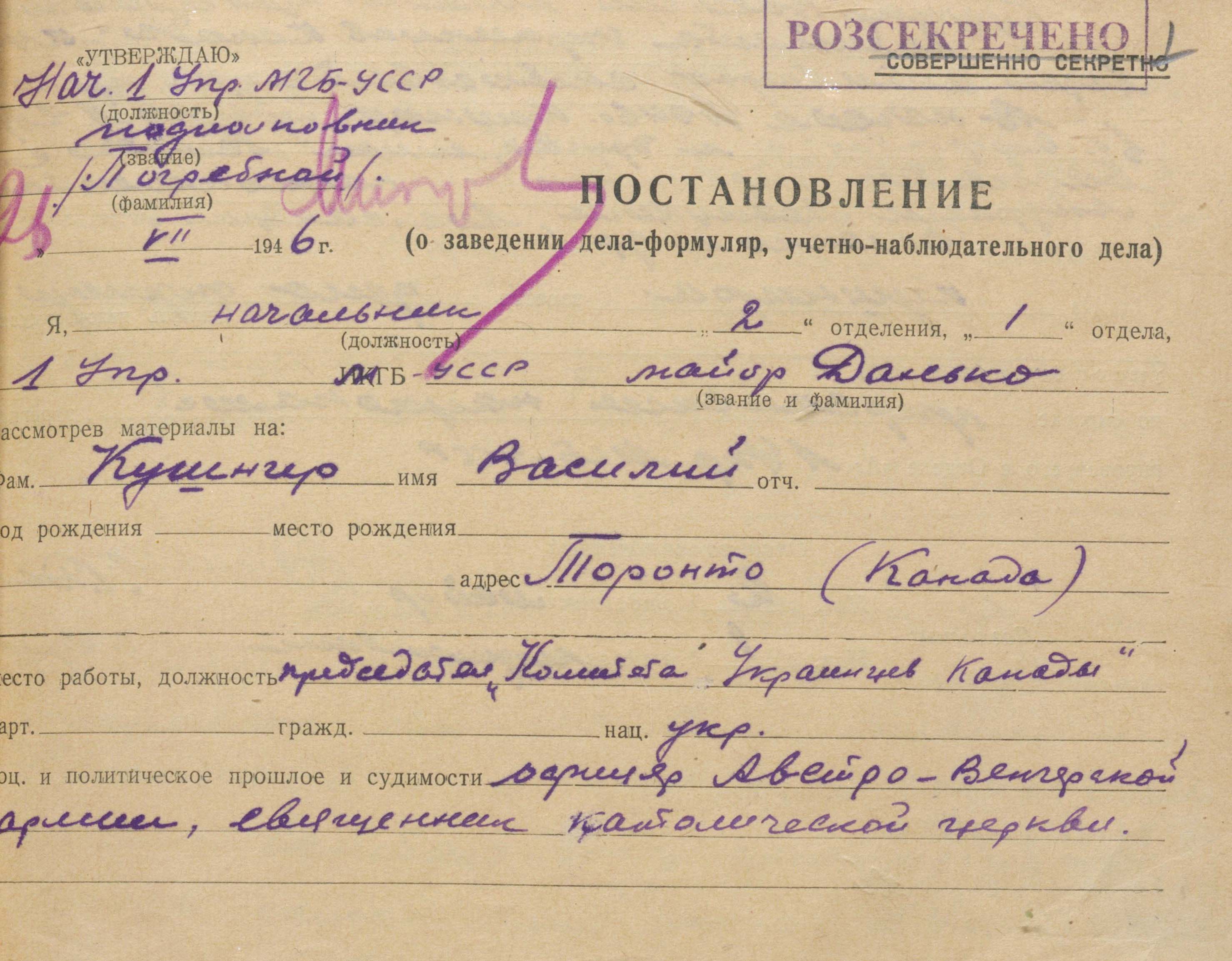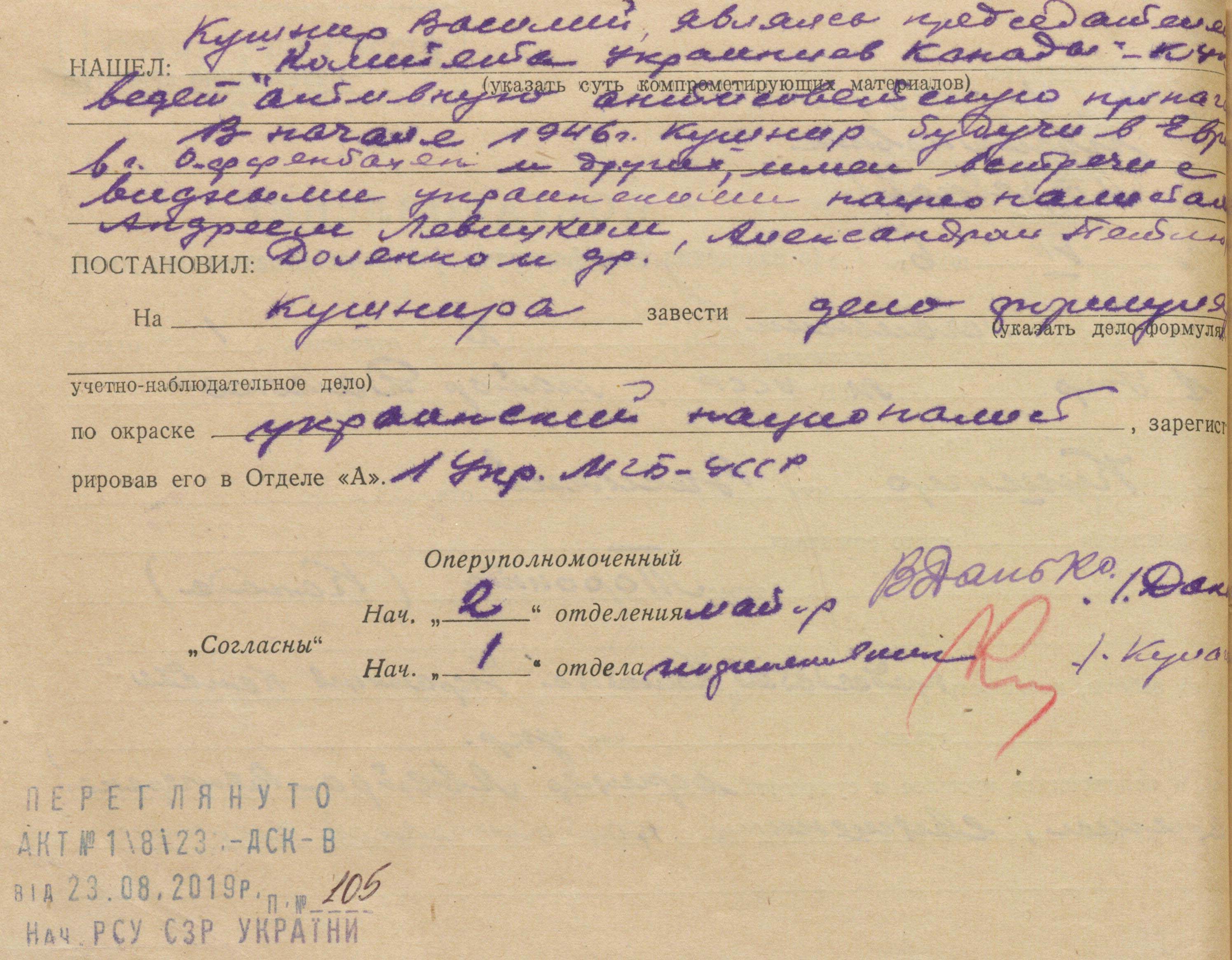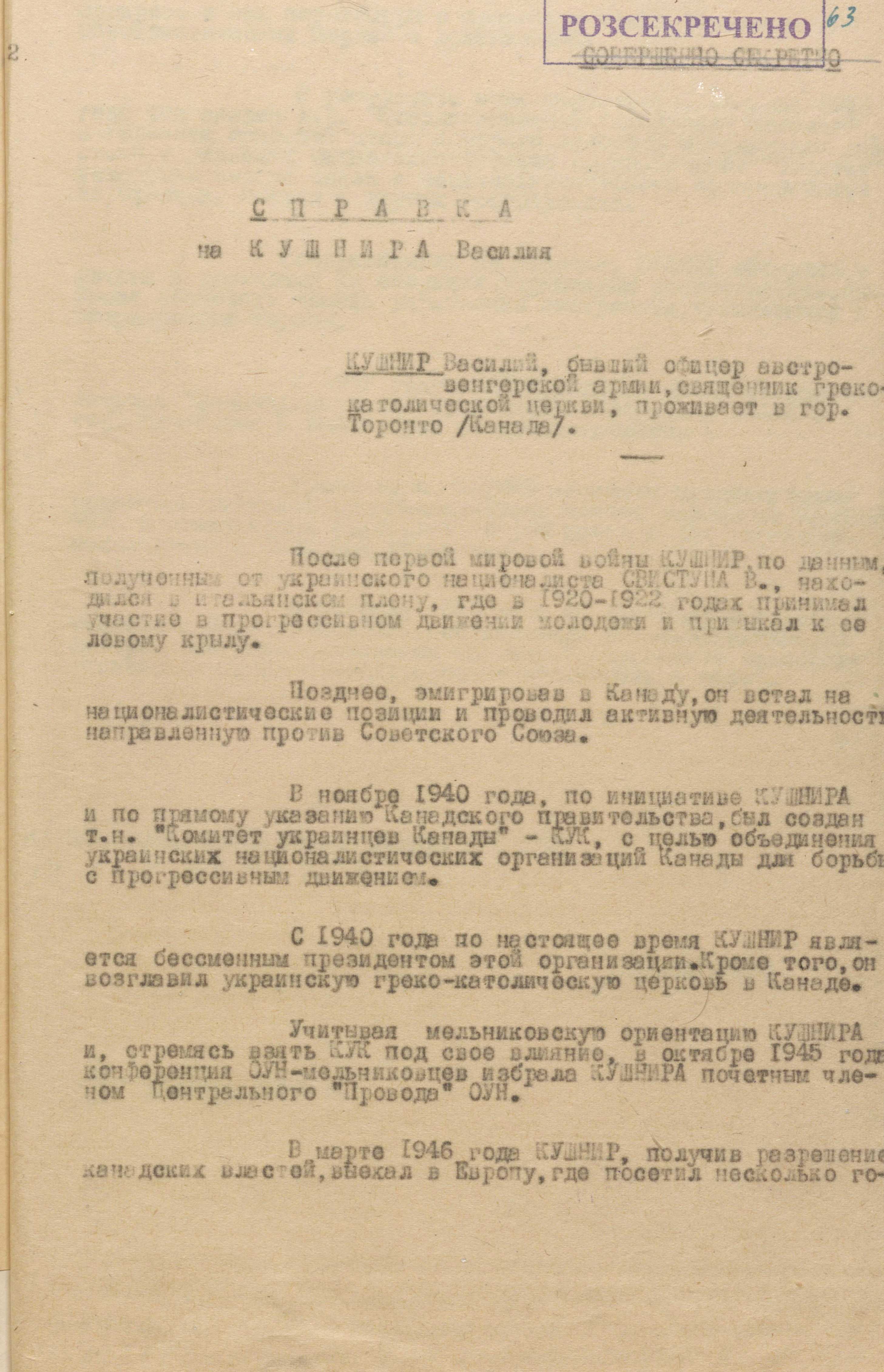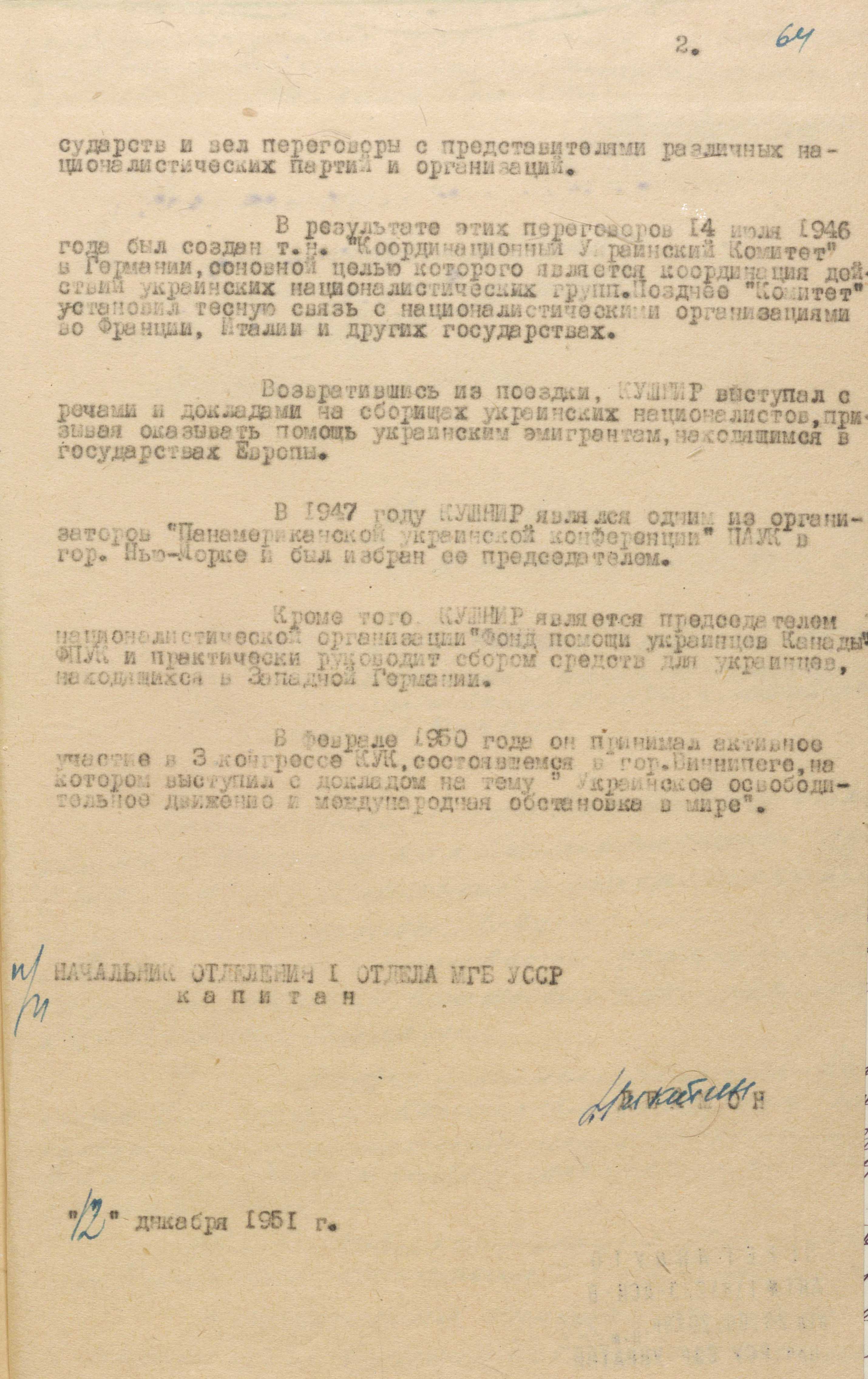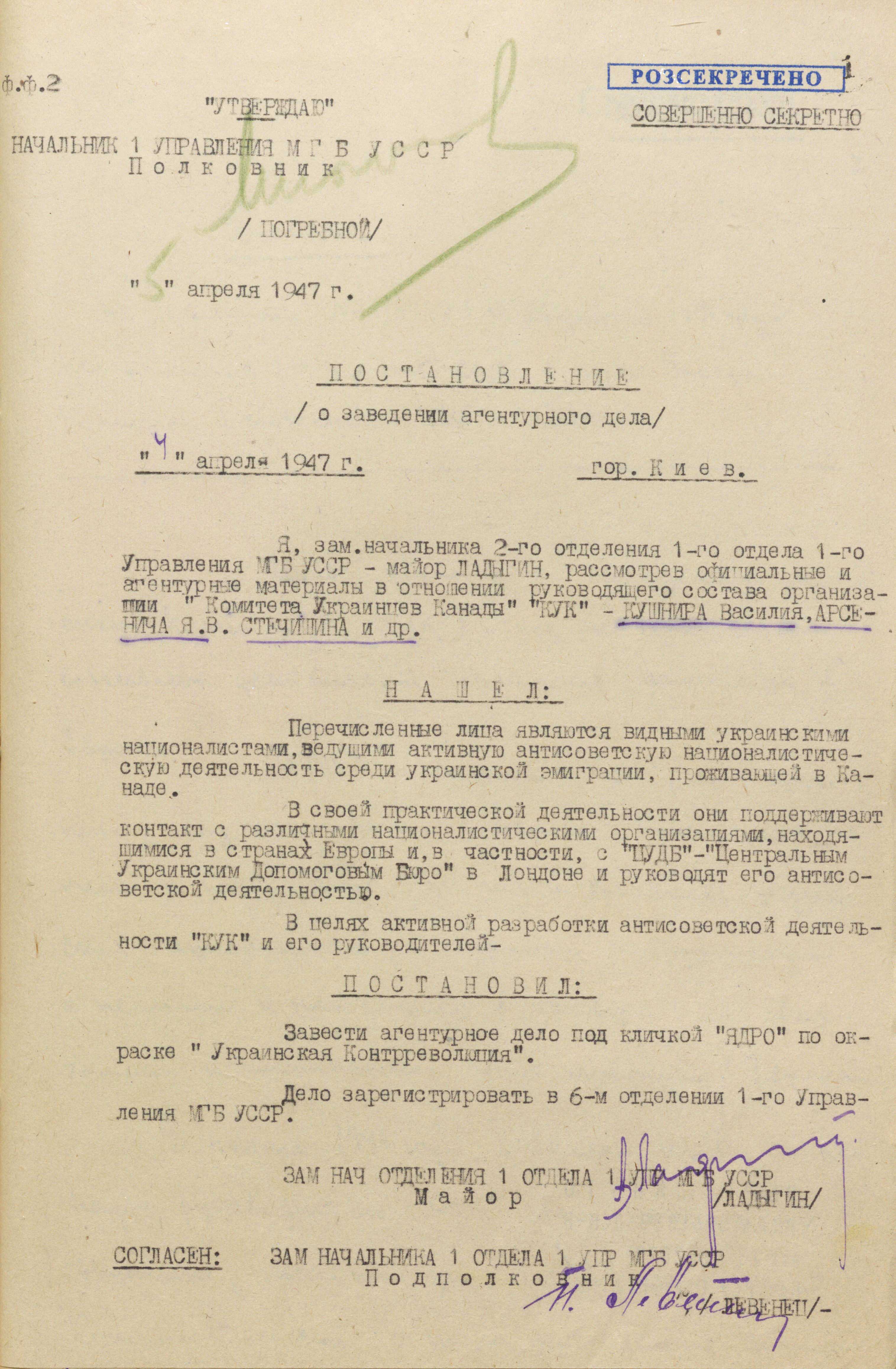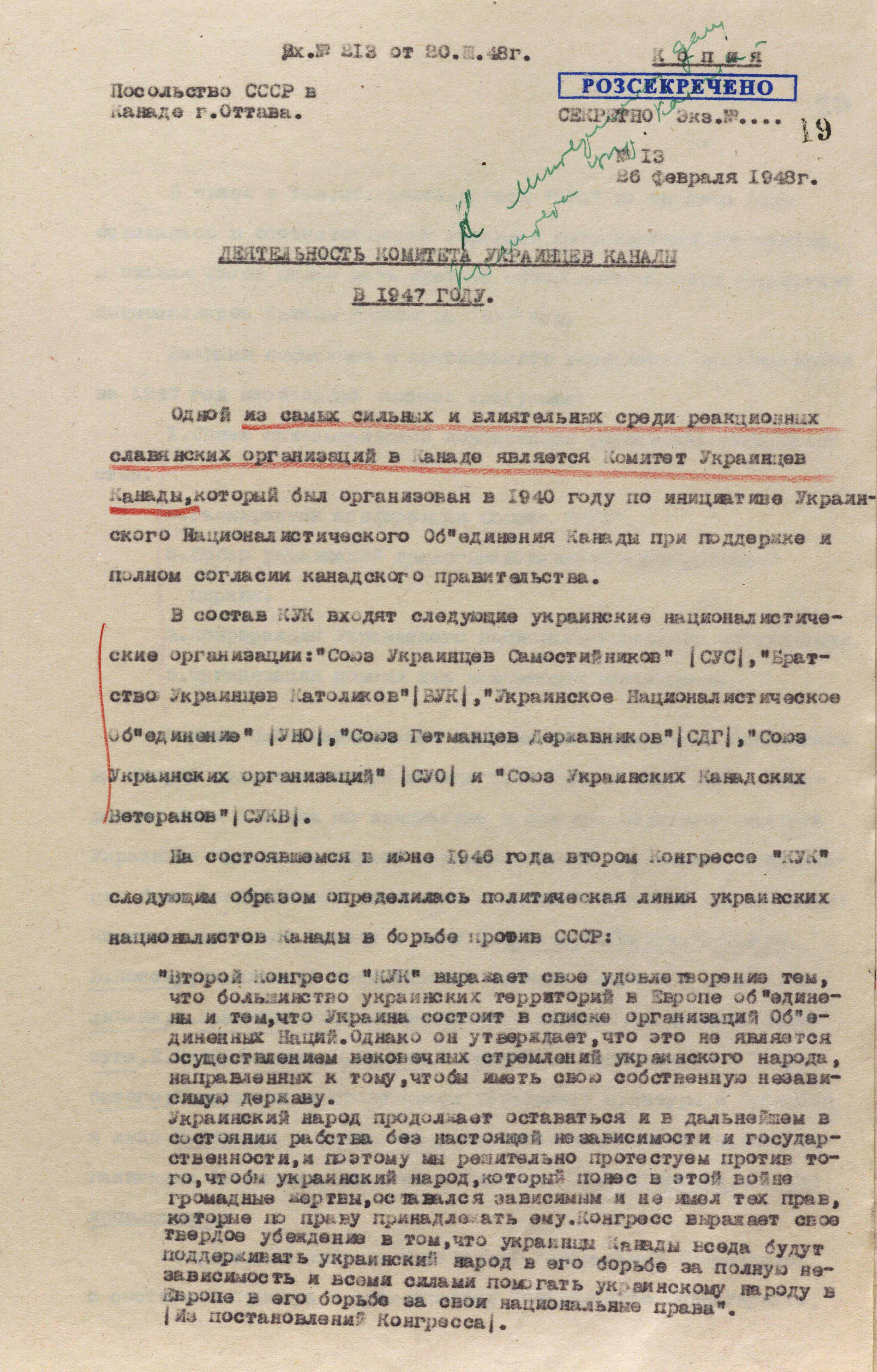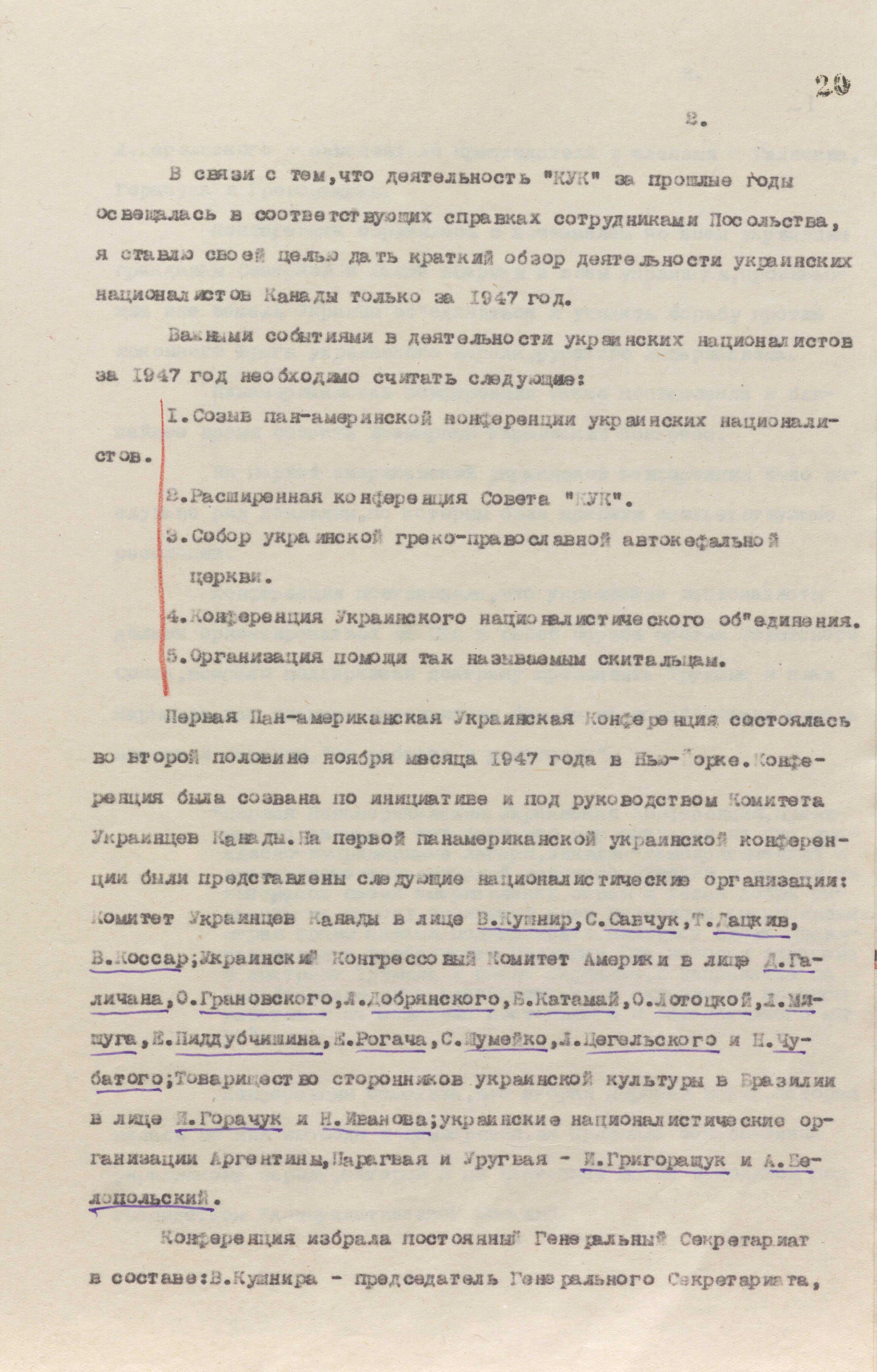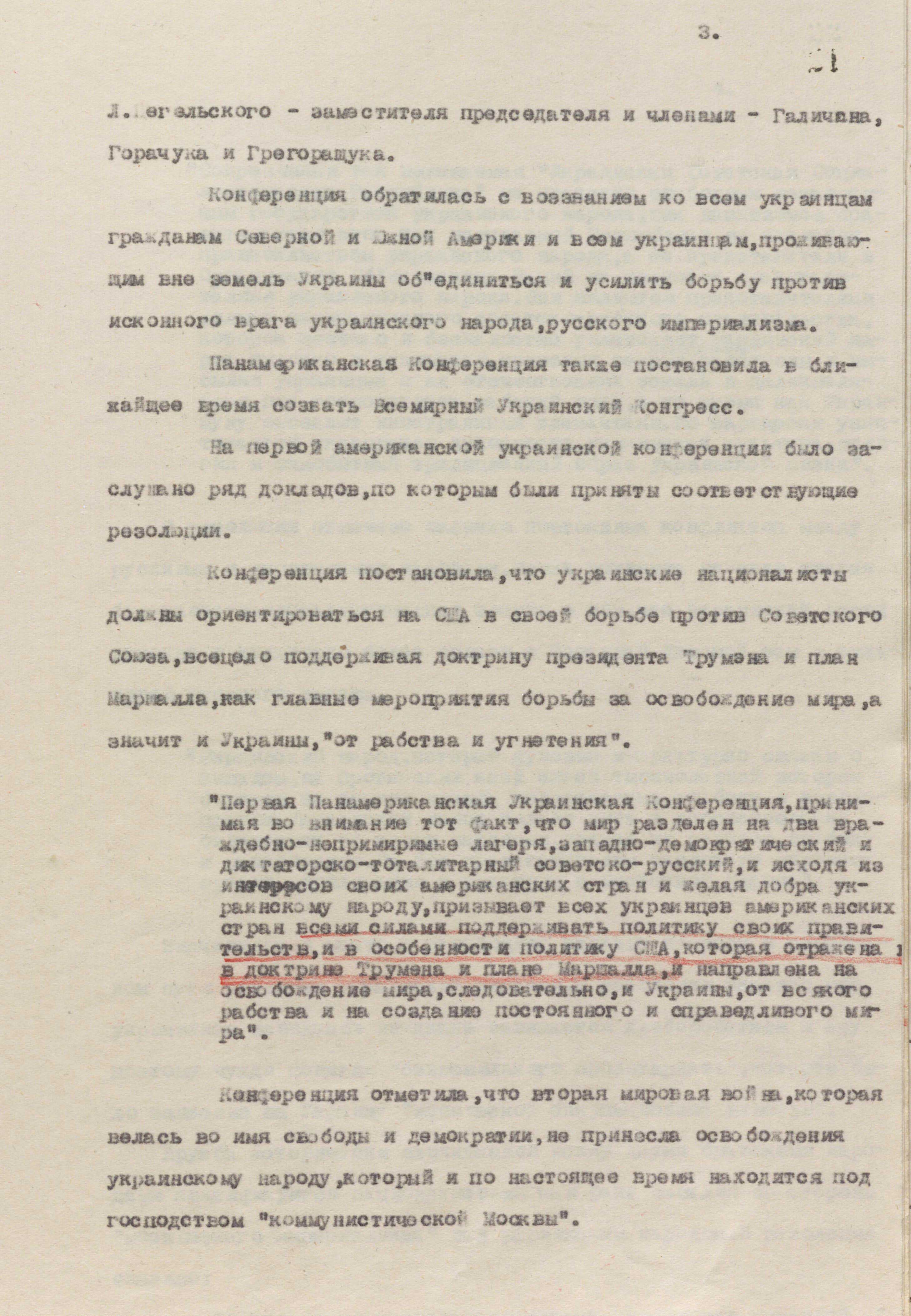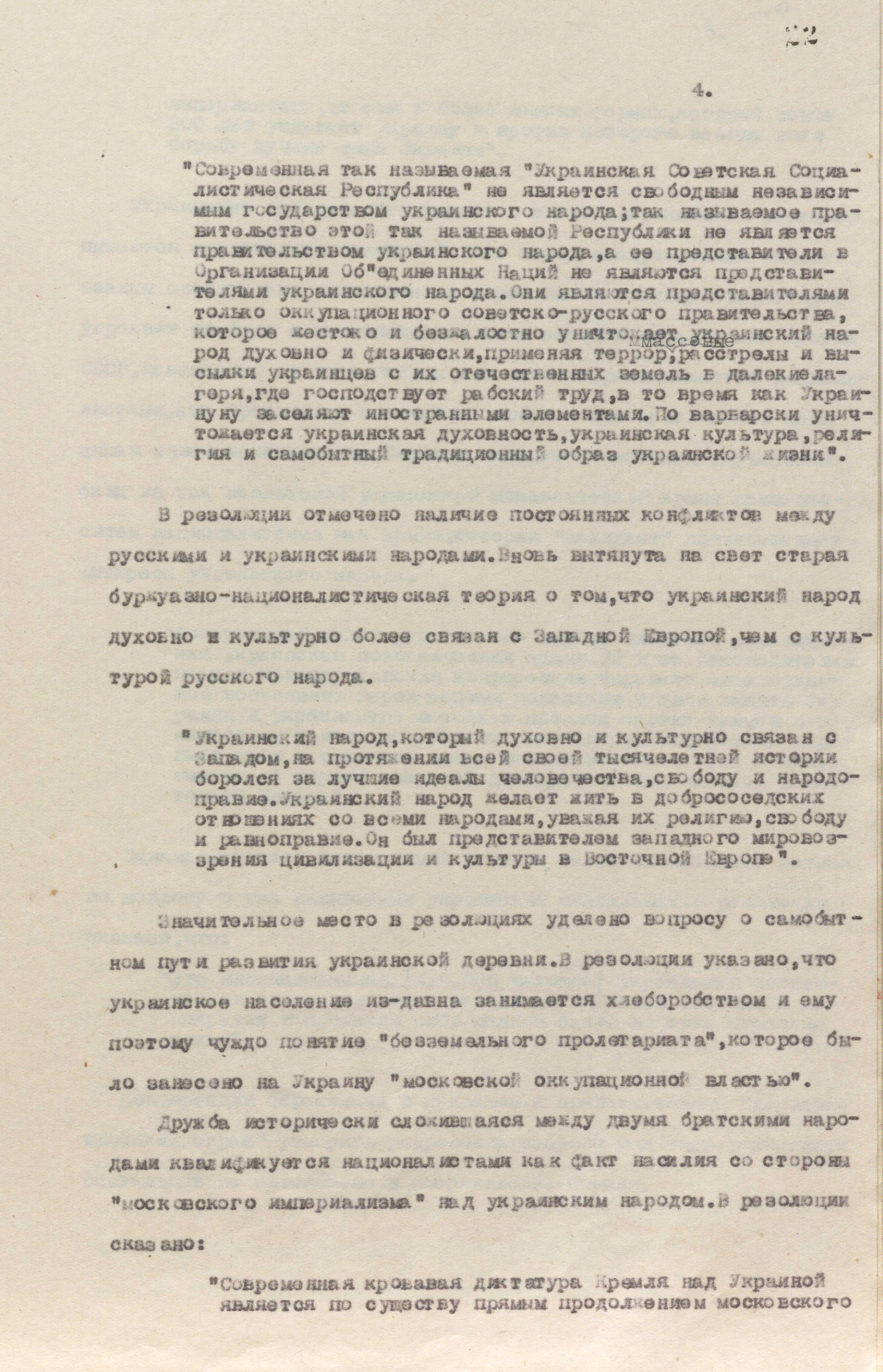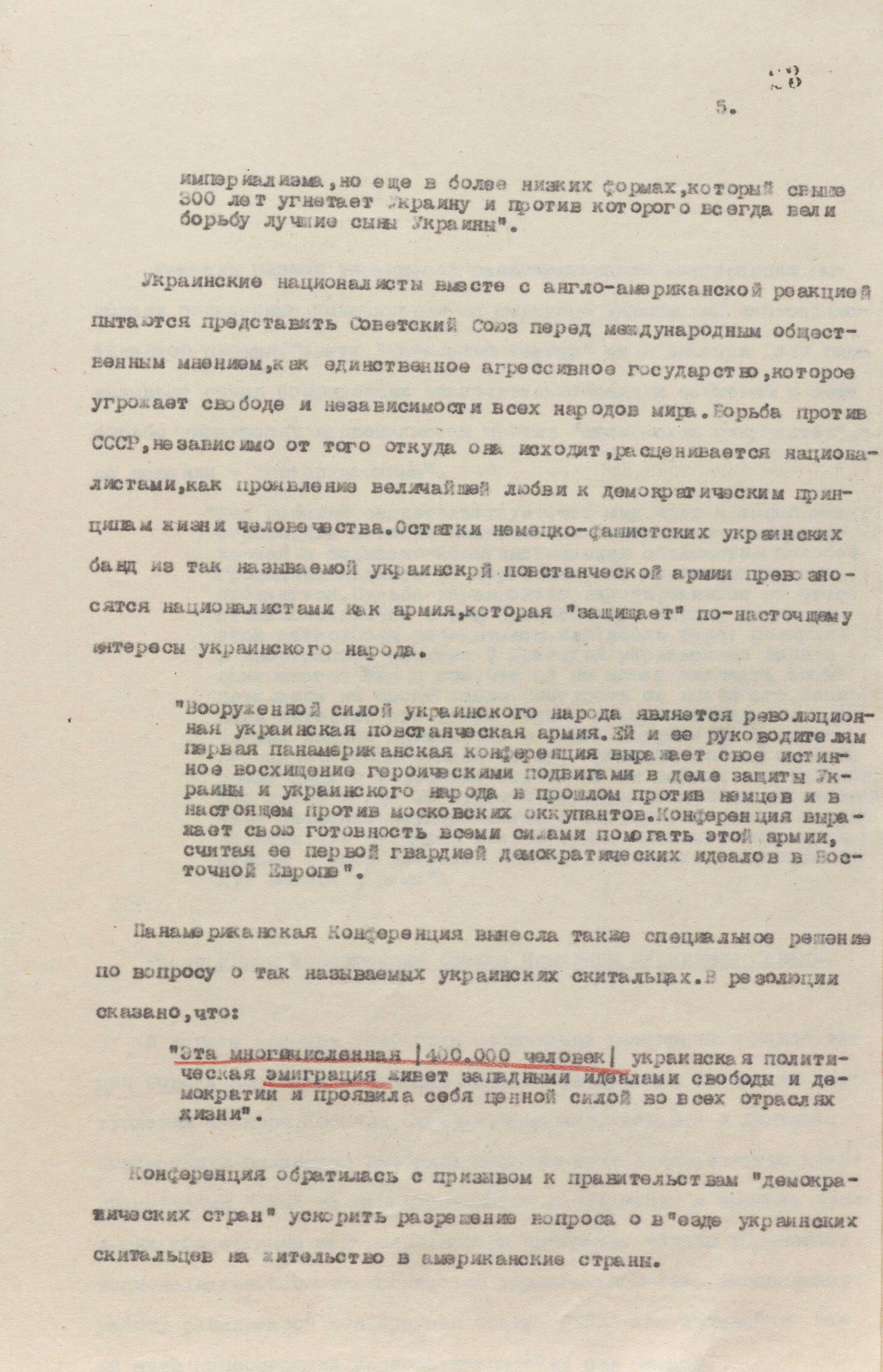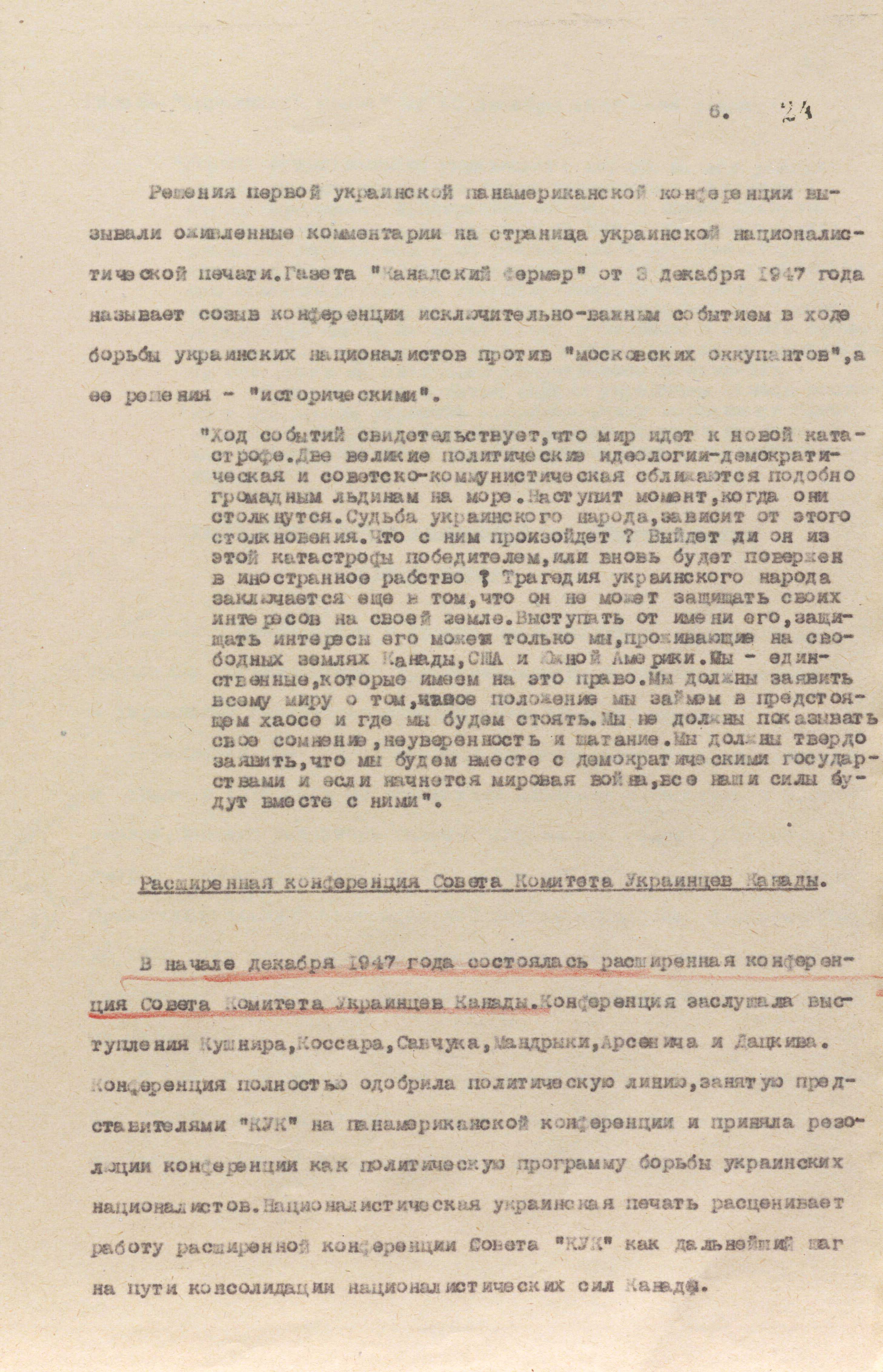Father Vasyl Kushnir. The First President of the Ukrainian Canadian Committee
11/6/2024
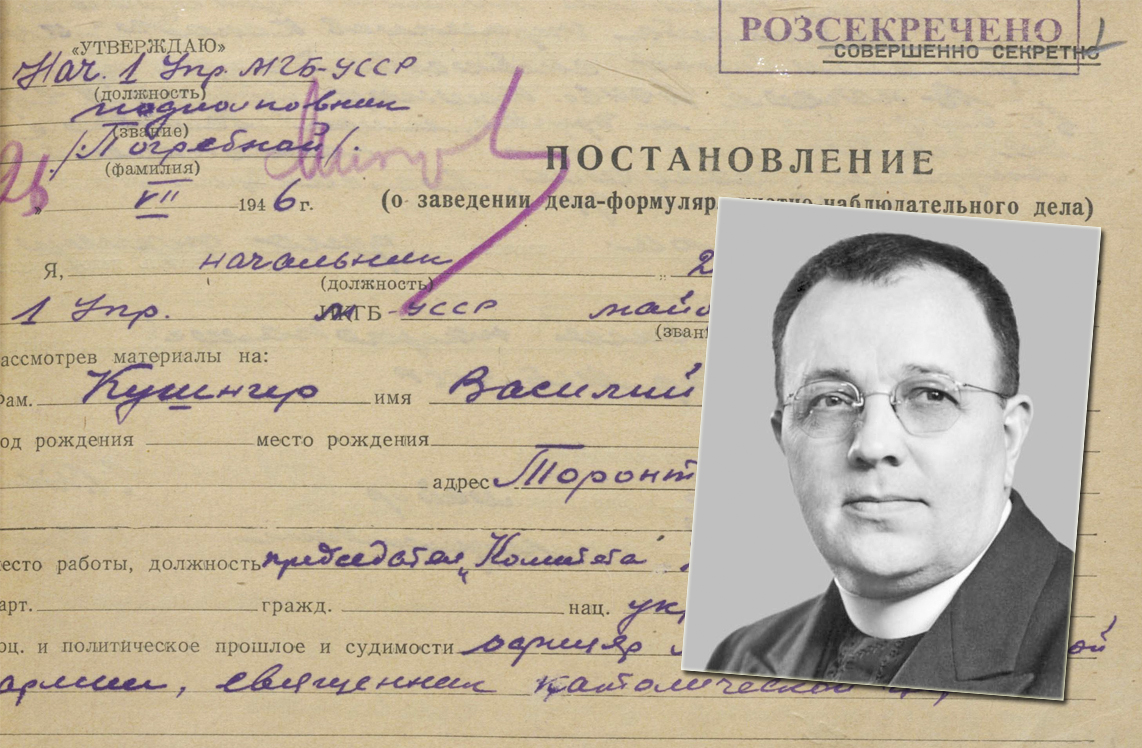
The abbreviation UCC has always appeared in operational documents of the mgb/kgb of the ussr alongside the phrases “anti-soviet activities”, “Ukrainian bourgeois nationalists”, and “irreconcilable enemies of the soviet union”. Similar epithets and comparisons were used against the activists who created and developed this powerful social and political organization. Among them was Father Vasyl Kushnir, the UCC’s first President and longtime leader (1940-1952, 1957-1971), President of the World Congress of Free Ukrainians (1967-1969, 1973-1978), a religious and public figure who consistently united the Ukrainian diaspora and directed it to support the national liberation movement in the historical homeland and the revival of Ukraine's independence.
“The UCC Is an Influential Counterrevolutionary Organization”
Despite the fact that the UCC was created at the end of 1940, the mgb of the Ukrainian ssr did not get around to its operational cultivation until April 1947. This is explained by the fact that during the Second World War, it was not a priority for stalin's special services, and the mgb had insufficient agent capabilities in Canada. The beginning of the Cold War was marked by the intensification of work against all anti-soviet organizations abroad. Among them was the Ukrainian Canadian Committee (since 1989, the Ukrainian Canadian Congress). It was taken into operational cultivation and a case was opened under code-name “Yadro” (“Nucleus”- Transl.) with the color “counterrevolutionary activity”.
A classified as “secret” report from the ussr’s embassy in Canada entitled “Activities of the Ukrainian Canadian Committee in 1947” states that the UCC was established in 1940 on the initiative of the Ukrainian National Association of Canada with the support and full consent of the Canadian government and is “one of the strongest and most influential among reactionary Slavic organizations”. The list of organizations that are part of it is given. It includes the Union of Ukrainian Independists, the Brotherhood of Ukrainian Catholics, the Ukrainian National Association, the Union of Hetmanists–Statesmen of Canada, the Union of Ukrainian Organizations, and the Ukrainian War Veterans Association of Canada.
It goes on to say that the second UCC Congress, held in June 1946, determined the political line of Ukrainian nationalists in Canada in the fight against the USSR as follows: “The Second Congress of the UCC expresses its satisfaction that most Ukrainian territories in Europe are united and that Ukraine is a member of the United Nations. At the same time, it affirms that this does not represent the realization of the Ukrainian people’s centuries-old aspirations to have their own independent state. The Ukrainian people continue to be enslaved without true independence, and we therefore strongly protest that the Ukrainian people, who have made enormous sacrifices in this war, should remain dependent and denied the rights that are rightfully theirs. The Congress expresses its firm conviction that Ukrainians in Canada will always support the Ukrainian people in their struggle for full independence and will do their utmost to assist the Ukrainian people in Europe in their struggle for their national rights” (BSA of the SZR of Ukraine. - F. 1. – Case 9868. - P. 19).
The paper devotes much space to information about the first Pan-American Ukrainian Conference, held in November 1947 in New York on the initiative of the UCC. A number of excerpts from the Conference's resolution are cited. They include “moscow’s imposition through occupying authorities on Ukrainian lands of orders alien to Ukrainians”, “barbaric destruction of Ukrainian spirituality, culture, religion and the original traditional way of Ukrainian life”, “about the eviction of Ukrainians from their homeland to distant camps and the settlement of Ukraine with a foreign element”, about admiration for the heroism of the Ukrainian Insurgent Army and ”about the readiness to help this Army with all our might, considering it the first guard of democratic ideals in Eastern Europe.”
The report was put on the desk of minister of state security of the Ukrainian ssr Serhiy Savchenko. It was supplemented by reviews of the UCC's activities from the Canadian press. In particular, there was a quote from the “Kanadskyi Fermer” (“Canadian Farmer”- Transl.) newspaper of December 3, 1947. It read as follows: “The course of events indicates that the world is heading for a new catastrophe. The two great political ideologies, democratic and soviet-communist, are coming together like huge ice floes on the sea. The moment will come when they will collide. The fate of the Ukrainian people depends on this collision. What will happen to it? Will it emerge from this catastrophe victorious, or will it be plunged back into foreign slavery? …We must declare to the whole world what position we will take in the coming chaos and where we will stand. We must not show our doubt, uncertainty, or wavering. We must firmly declare that we will be together with the democratic states, and if a world war breaks out, all our forces will be with them” (BSA of the SZR of Ukraine. - F. 1. – Case 9868. - P. 24).
Besides, information was soon received about the next Congress of the UCC. It says that the leadership of the mgb of the Ukrainian ssr was alarmed by the information that the activities of Ukrainian organizations were supported by representatives of the Canadian government and MPs. For example, one of the references stated that the Congress was attended by “Lieutenant General from the province of Manitoba Mac Williams, Mayor of Winnipeg Garnet Coulter, President of the University of Manitoba Jillson, President of Acadia University Watson Kirkconnell, Professor of the University of Saskatoon George Simpson, representatives of the Federal Government Kaus and V. Kisilevskyi, Member of the Federal House of Commons Ivan Dikur, Members of Parliament of Manitoba I. Solomon, I. Havryliuk, M. Bachynskyi, V. Lupko, and others. On behalf of the guests of honour, greetings were delivered by Coulter, Jillson, Kisilevskyi, and Dikur, who in their speeches strongly encouraged Ukrainian nationalists’, and especially the UCC’s activities hostile to the ussr and progressive movement” (BSA of the SZR of Ukraine. - F. 1. – Case 8038. - P. 46).
Reports from overseas also mentioned that President of the UCC Vasyl Kushnir was received by Canadian Prime Minister Louis St. Laurent, who stated that he had always been interested in the Ukrainian issue. As a result, the mgb opened a separate case-file on V. Kushnir.
An Admirer of the Ukrainian Sich Riflemen
Vasyl Kushnir is a prominent figure in the history of the Ukrainian national liberation movement. He was born on September 17, 1893, in the village of Vikno in now Chortkiv district of Ternopil region. In 1924-1927 he studied at the Lviv Theological Seminary and was soon ordained a priest. He studied theology at the Leopold and Franz University of Innsbruck (Austria). He defended his doctoral dissertation on “Christianization of Ukraine” and was granted the title of Doctor of Theology. He taught at the Stanislav (now Ivano-Frankivsk) Theological Seminary. In 1934, he emigrated to Canada, where he became the priest of the Greek Catholic parish of Saints Volodymyr and Olha in Winnipeg. In 1940, he became a founding member and President of the Ukrainian Canadian Committee.
By that time, the mgb had managed to collect only fragmentary general information about him. Characteristically, many documents invariably referred to him as a former officer of the Austro-Hungarian army. In this regard, open sources stated that he fought in the Austro-Hungarian army on the Italian front during World War I, was held prisoner of war for three years, and then returned to Ukraine via Odesa.
The publications also mentioned that he always paid tribute to the Ukrainian Sich Riflemen. In particular, in 1936, with the support of former Ukrainian military servicemen, he built a symbolic grave (cenotaph) for the Ukrainian Sich Riflemen and held a solemn memorial service with the participation of priests and three thousand lay people in the city of Winnipeg.
But the chekists were less interested in the past. They paid more attention to what he did in the postwar period.
The case file reports that he headed the Ukrainian Greek Catholic Church in Canada and had been the permanent leader of the UCC since 1940. It was his activities at the head of the Ukrainian Canadian Committee that were later the focus of operational documents. All of his trips, contacts, and meetings were recorded and analyzed.
One of the memos states as follows:
“Taking into consideration Kushnir's OUN(M) orientation and seeking to bring the UCC under his influence, in October 1945 the OUN(M) Conference elected Kushnir an honorary member of the OUN Central Provid.
In March 1946, Kushnir, having received permission from the Canadian government, traveled to Europe, where he visited several countries and negotiated with representatives of various nationalist parties and organizations.
As a result of those negotiations, on July 14, 1946, the so-called “Ukrainian Coordination Committee” was established in Germany, with the main goal of coordinating the actions of Ukrainian nationalist groups. The Committee soon established close ties with nationalist organizations in France, Italy, and other countries.
After returning from his trip, Kushnir delivered speeches and reports at meetings of Ukrainian nationalists, calling to help Ukrainian emigrants in Europe.
In 1947, Kushnir was one of the organizers of the Pan American Ukrainian Conference (PAUC) in New York City and was elected its Chairman.
In addition, Kushnir is the head of the nationalist organization “Ukrainian Canadian Assistance Fund” (UCAF) and practically manages fundraising for Ukrainians in West Germany” (BSA of the SZR of Ukraine. - F. 1. – Case 8038. - P. 63-64).
A number of other documents are devoted to V. Kushnir's trip to Europe. For the UCC, it was a matter of particular importance. It was about the fate of Ukrainians who found themselves in European countries after World War II and did not want to return to the ussr for various reasons, fear of reprisals included. Under the leadership of V. Kushnir, the UCC sought to end the forced repatriation of Ukrainians and to grant political refugee status to displaced persons. In the documents of the time, which have been preserved in the archives of the Intelligence Service, such persons were called wanderers.
To Save the Wanderers
On July 23, 1946, Senior Lieutenant Starchenko, a senior operative of the mgb of the Ukrainian ssr, made an extract from the report of the second secretary of the ussr embassy in Canada, M. Volyanko, on a conversation with the head of the Society for Cultural Relations with Ukraine, V. Svystun. In the report, forwarded from moscow to Kyiv, the embassy official reported that since August 1945, the UCC had been seeking permission from the Canadian government for V. Kushnir to travel to Europe. The aim of the trip was to meet with Ukrainian wanderers and discuss ways to resolve this issue with representatives of other emigrant organizations and political parties. In particular, it was assumed that a certain number of people would be able to obtain permission to travel to Canada.
In this regard, according to the document, the UCC issued several statements and in December 1945 addressed the Prime Minister of Canada with a memorandum in defense of the wanderers. It is emphasized that “the issue of the wanderers was even raised in the Parliament and 25 members of the Federal Parliament signed a statement to the Prime Minister regarding assistance to the wanderers.” Eventually, permission to travel was granted at the end of December 1945.
“Kushnir is currently in London”, the report continues, “and is meeting with like-minded people in England and other European countries. However, Kushnir did not go as a representative of the UCC, but as a representative of the Foundation for the Assistance of Ukrainians in Canada” (BSA of the SZR of Ukraine. - F. 1. – Case 8038. - P. 2-5).
Another mgb’s document states that V. Kushnir returned to Canada in May 1946 and, as an eyewitness to the suffering of the wanderers, said that there were about 300,000 of them in Europe and that they did not want to return to the soviet union for fear of arrest and exile to siberia.
In addition, it was reported that the Ukrainian nationalist press regularly receives letters from wanderers with stories of their wanderings and publishes them in its newspapers. This, they say, has a certain emotional impact on the decision-making of the authorities. In this regard, the mgb initiated sending a representative of the so-called progressive Ukrainian press from Canada to Ukraine. All the conditions had to be created for his preparation of propaganda articles about how good life was in the ussr and about the allegedly humane policy of the soviet government aimed at the mandatory return of all citizens home.
The way events unfolded and the issue of the wanderers was resolved is described in a memo addressed by the ussr’s embassy in Canada to the minister of state security of the Ukrainian ssr, Serhiy Savchenko. It states that after V. Kushnir returned to Canada, the Ukrainian community organized a series of meetings calling on the Canadian government to grant permission for the wanderers to resettle. These appeals were supported by both the Government and Parliament. The resolution of the Second Congress of the UCC, held in 1946, expressed “gratitude to the Members of Parliament and Senators of Canada for their desire to open Canada’s doors to these Ukrainian wanderers and thereby help them in resolving the question of their place of residence.”
Finally, it is pointed out that at the initiative of the UCC and with the consent of the Canadian government, a special mission was established to assist Canadian immigration authorities in Europe in selecting candidates from displaced persons camps for entry into Canada.
This means that the process had moved forward. The document names those who actively contributed to that. “The UCC's policy on the entry of Ukrainian wanderers to Canada”, reads the document, “has found its supporters in the person of Senator Rybak, members of the Federal Parliament Hlinka, Zaplitnyi and others. The federal government facilitated the entry of displaced persons. In just 10 months of 1947, more than 5,000 wanderers came to Canada... The government allowed Archbishop Mstyslav, the ardent enemy of the soviet union, to come to Canada. Soon after, the former Minister of Education of the Petliura government, Ohiyenko, arrived in Canada. On November 28, 1947, the famous Ukrainian nationalist-fascist D. Doroshenko, Professor Kyslytsia, and others came to Canada” (BSA of the SZR of Ukraine. - F. 1. - Case 9868. - P. 31-35).
According to archival documents, the process was difficult and lengthy. It required numerous approvals and compliance with various legal procedures. But the UCC did not stop making efforts. Soon after, on the initiative of the UCC and with the direct participation of V. Kushnir, the Central Ukrainian Aid Bureau was founded in London, headed by Sotnyk Bohdan Panchuk. Together, they continued the campaign to resettle Ukrainians to Canada, not only from the United Kingdom, but also from Western Europe in general.
Support from the Canadian government helped revitalize Ukrainian immigrant organizations. This prompted them to intensify their work and take new measures not only to support the wanderers, but also the national liberation movement for the restoration of Ukraine's independence. According to archival documents, at the Third Congress of the UCC, the attention of all those present was drawn to the speech of the leader of the Ukrainian National Association, V. Kossar.
“The world is now listening to the voice of Ukraine more and more”, he stated. “A vivid example of this is US President Truman’s personal greeting to the Congress of Ukrainian Americans held in Washington in 1949. Another proof of this is the presence at all UCC Congresses of official representatives of the Canadian government who are showing more and more interest in the Ukrainian liberation movement every year, and we need as many such friends of Ukraine as possible. We have them, and we will have more of them in the future. Our unanimous resolutions on all issues of vital importance to the Ukrainian people add to our friends among Canadian citizens... Thanks to our activity, the world should come to the realization that as long as the great russian empire exists, there will be no peace in the world...” (BSA of the SZR of Ukraine. - F. 1. - Case 8038. - P. 50-51).
On the other hand, all this was negatively perceived in moscow. They regularly received information from the ussr embassy in Canada about the developments and forwarded those reports to the lubyanka so that the necessary operational measures could be taken in the mgb’s line. The embassy did not hide its attitude to the activities of the UCC and its head, V. Kushnir, and were not picky with words to assess their activities. In their reports, embassy officials called the UCC “the strongest and most aggressive organization in the world”, “a center for consolidating Ukrainian nationalist organizations hostile to the soviet union throughout the Americas and Europe”, and so on.
“The nationalists' slanderous anti-soviet propaganda”, the embassy was indignant, “meets with no obstacles from the government authorities. Moreover, the nationalists have the direct support of the liberal King government in their activities. The government has allowed the Ukrainian Canadian Committee to send its mission to Europe, which works closely with Canadian immigration authorities to select reliable individuals among Ukrainian wanderers to enter Canada. Fundraising to help wanderers in Europe is allowed. The government, for its part, gave permission to send food to the wanderers, even from the range of food that was rationed at the government level, such as butter, sugar, and so on” (BSA of the SZR of Ukraine. - F. 1. – Case 9868. - P. 37).
Pursuant to the instructions of the kremlin leadership, the mgb of the ussr set tasks for both its residentura in Canada and the mgb of the Ukrainian ssr to monitor this process, to prevent the resettlement of wanderers in every way possible, to find negative information about Canadian figures who helped in resolving these issues, and on this basis to compromise them in the press, to carry out agent-operational cultivation of the UCC. However, there is no evidence that anyone from the UCC was recruited or that agents were infiltrated into the inner circle of the Organization's leaders.
Therefore, the decision of the mgb of the Ukrainian ssr of March 3, 1953, stated that in the case of the operational development of the UCC leadership headed by Vasyl Kushnir, “there are no direct approaches to the defendants in the case”. The case was closed and archived. However, other archival documents show that the monitoring of the activities of the UCC and all its active members did not stop in all subsequent years. In particular, they tried to keep V. Kushnir himself under constant surveillance, as, after his re-election, he was the Honorary President of the UCC from 1971 to 1979.
The mgb, and then the kgb, opened new letter files, cases, and so on. Agents and proxies who traveled to Canada as part of various delegations or on private business were certainly tasked with collecting information about the activities of the UCC. This large public representative council, which over the years united more than thirty Ukrainian Canadian organizations and their branches, kept the kremlin on its toes until the collapse of the ussr.
In more recent times, after 2014 and especially after the start of russia's full-scale invasion of Ukraine, the UCC has angrily condemned the kremlin's actions. As in the first period of its existence, the Congress has been doing its best to ensure that the Canadian government provides assistance to Ukraine in countering putin's aggression. For this, in 2022, the ministry of foreign affairs of the rf banned more than thirty members of the UCC from entering russia. The sanctions list also includes the top leadership of Canada. And the ministry of justice of the rf included the Ukrainian Canadian Congress in the list of “undesirable organizations”.
